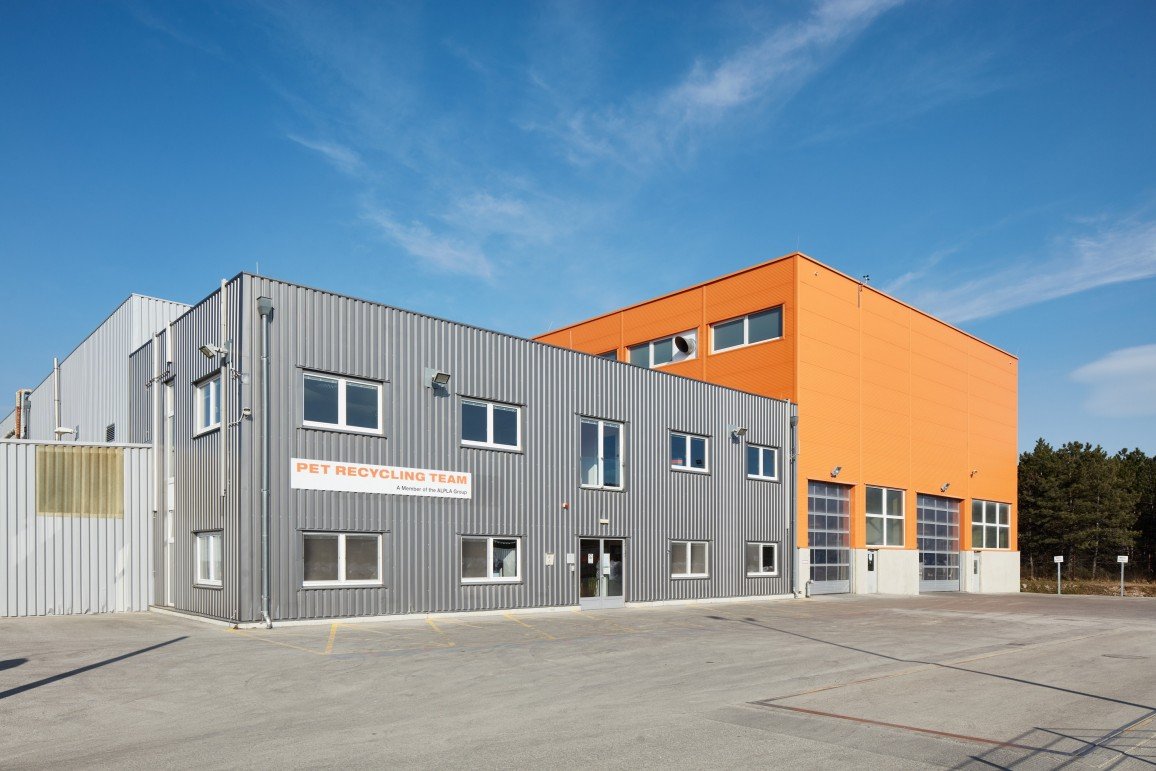PET Recycling Team further improves carbon footprint of rPET

PET pellets from post-consumer drink bottles provided by PET Recycling Team GmbH, a subsidiary of ALPLA, result in greenhouse gas emissions that are only a tenth of the level for new material. This has been confirmed in a recent Investigation.
Last year, PET Recycling Team (PRT) in Wöllersdorf, Lower Austria, obtained a measurement of the environmental impact of recycled PET (rPET) produced in-house. The calculated value was a carbon dioxide equivalent of 0.45 kg for every kilogram of material produced. A new calculation by c7-consult takes into account the now optimised power mix, resulting in a carbon dioxide equivalent of just 0.21 kg.
‘By switching to electricity from renewable sources, we have again managed to reduce CO2 emissions by a considerable margin,’ says Peter Fröschel, plant manager. ‘Our annual production of rPET amounts to around 31,000 tonnes. It would take a mixed forest area the size of 6,231 football pitches to absorb the same amount of carbon dioxide emissions we are saving each year compared to the production of new PET material.’
Growing demand for rPET
New material, also known as virgin PET, has a carbon dioxide equivalent of 2.15 kg per kilogram. This means that the greenhouse gas emissions for recycled material from Wöllersdorf are only a tenth as high. CEO Günther Lehner sees this as confirmation of the sustainability strategy at ALPLA: ‘We have noticed greater demand for products made from recycled materials. In recent years, we have managed to move away from discussions that focus purely on cost, establishing sustainability as a core value.’
Entire recycling process examined in detail
The environmental impact (carbon footprint) was calculated in accordance with ISO 14044, starting with the collection and sorting of used PET bottles and covering transportation to the Wöllersdorf plant as well as washing, processing and granulating. The analysis is based on the mass and energy balance (electricity and gas consumption) for 2016, which has remained constant since.
Investment in PET recycling
ALPLA has been working intensively on plastic recycling methods for over 20 years. ‘Our customers are committed to sustainability, and we support them with our expertise. We believe that recycling is appropriate and important not just for legal reasons: it is an economic sector of great significance for the environment and the future of our industry,’ says CEO Günther Lehner.
ALPLA operates recycling plants in three locations. In addition to the wholly owned subsidiary in Wöllersdorf, a plant was established in 2013 in Radomsko, Poland, and there is a joint venture in Mexico. In total, 65,000 tonnes of food-grade rPET is produced from post-consumer material at the three plants each year.
More information:
www.petrecyclingteam.com
www.alpla.com/en/sustainability
www.c7-consult.at
PET Recycling Team GmbH (PRT) – fact box
2005 Founded in Wöllersdorf
2010 ALPLA becomes majority shareholder
2012 Subsidiary company PRT Radomsko constructed (southern Poland)
2014 ALPLA takes over PRT completely
Employees: 50 in Wöllersdorf (75 in Radomsko)
Annual production in Wöllersdorf: 31,000 tonnes of rPET
Annual production in Radomsko: 11,000 tonnes of rPET
Products: PET pellets, PET flakes, PO flakes
What does the term carbon footprint mean?
The carbon footprint or environmental impact indicates the amount of greenhouse gas emissions (e.g. carbon dioxide, methane, nitrous oxide) that occur throughout the entire life cycle of a product. It is calculated for a defined functional unit – in this case for a kilogram of rPET, produced in 2016 at the Wöllersdorf recycling plant of PET Recycling Team GmbH (part of the ALPLA Group). For further information about the calculation, please see www.carbonfootprint.com.
About ALPLA:
ALPLA is one of the leading companies in plastic packaging. Around 19,300 employees worldwide produce custom-made packaging systems, bottles, closures and moulded parts at 176 sites across 45 countries. The high-quality packaging is used in a wide range of areas, including food and drinks, cosmetics and care products, household detergents, washing and cleaning agents, engine oils and lubricants. ALPLA celebrated its 60th anniversary in 2015.
